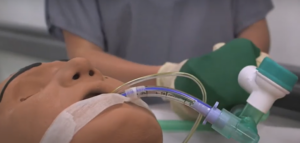Education and development
St George’s University Hospitals NHS Foundation Trust is fully committed to investing in the knowledge and skills of its employees and supporting lifelong learning for all staff.
We want everyone who works for us to reach their full potential by developing skills through a wide range of career progression and professional development opportunities.
We provide a broad range of learning and development opportunities and accommodate different learning styles allowing for maximum flexibility.
Learning opportunities are both formal and informal including; induction, mandatory refresher training, leadership and management programmes, e-learning, simulation, and work based learning.
Work based learning is at the heart of CPD and includes; coaching on the job, mentoring, job rotation and job shadowing, action learning sets, and work based projects.
As an Education and Development Service we:
- Promote the value of learning and development in the workplace and the delivery of Continuing Professional Development (CPD)
- Support all staff to carry out an annual PDR (Performance and Development Review/Appraisal)
- Support your personal development
- Support the development of managers and leaders
- Support the development of teams and services
- Support the organisation to work as a whole system
- Provide training to enhance patient safety and experience
- Support the development of a learning organisation
- Direct members of staff to information, resources and supports systems that enable access to learning opportunities and resources
St George’s Advanced Patient Simulation and Skills Centre (GAPS) uses simulation and other educational tools and techniques to help healthcare teams achieve their full potential. Our centre includes two full-immersion high-fidelity simulation suits, a fully-equipped skills lab, part-task trainers and a post-graduate dental and micro-surgery unit. GAPS provides in-house and external mobile simulation and support for satellite simulation groups. Read more about GAPS on their website.
St George’s University Hospitals NHS Foundation Trust staff also benefit from an on-site Medical School and Faculty, which links Kingston University to the Medical School. This enables our staff to use the Medical School’s extensive library for continued learning and professional development.
All staff are encouraged to take responsibility to develop and participate in life long learning.
The education and development department’s year in numbers
- GAPS train more than 4,000 doctors, nurses, allied health professionals and final year medical students each year
- St George’s has 330 student nurses and has developed a guaranteed employment route for them in partnership with our nursing directorate, King’s College London and Kingston University
- 1,565 staff, students and trainees attended induction and orientation programmes
- 1,805 staff members completed their statutory and mandatory training at face-to-face training sessions – this resulted in 43,130 subjects completed in 24,910 hours of learning time
- 3,228 staff members completed their statutory and mandatory training online – this resulted in 37,307 subjects undertaken through eLearning in 3,228 hours or learning time
- 3,218 applications to attend study days, courses, qualifications and conferences from non-medical staff were funded. These applications were from non-medical staff, both clinical and non-clinical
- 607 doctors attended training on external courses funded via the London Deanery and in-house development programmes
- 1,202 members of staff attended management development courses, leadership and team development programmes
- 2,014 staff members attended in-house training programmes such as equality and diversity, mentorship updates, preceptorship, train the trainer and various medicines administration courses
- 2,581 healthcare professionals attended clinical skills and simulation courses based at the trust, as well as ‘in situ’ training within community settings
- 343 young people were given work experience placements in the trust, including five students from Project SEARCH, a work experience programme for local students with a learning disability
Focus on GAPS
St George’s Advanced Patient Simulation and Skills Centre is a Trust facility based in Hunter Wing of the University. GAPS train more than 4,000 doctors, nurses, allied health professionals and final year medical students each year through internal, external and specific HEE contracts. It is widely recognised as one of the most innovative inter-professional healthcare simulation and skills facilities in the country delivering courses using a variety of technology enhanced learning initiatives.
However, its core business is the training and support of St George’s workforce in caring for acutely ill patients by focusing on building resilience of safety within teams as well as individuals. Staff learn in multi-professional teams and reflect by engaging in interprofessional conversations about practice provoked by experiences gained in either the simulated or real clinical environment.
Simulation-based training takes place both in the GAPS centre and out in clinical areas of the Trust working collaboratively with local clinical experts (eg. Wards, delivery suite, emergency department, operating theatres, critical care units and satellite areas). GAPS also delivers simulation-based training in the community; local GP and Dental practices focusing on team work and emergency preparedness capacity for staff to respond to life-threatening medical emergencies.
Learn more about the work of GAPS on their website.
Focus on healthcare assistants (HCAs)
- 98 HCAs joined the trust this year and took part in relevant induction programmes
- 13 HCAs are studying the new Foundation Degree in Healthcare Practice which is delivered by Kingston University
- 19 HCAs received funding to attend courses to develop technical and interpersonal skills
- 75 took part in team building sessions
- 50 attended the HCA forum which provides an opportunity to learn from peers and trust experts
- 60 HCAs took part in ward-based development work
- 300 attended briefing sessions on the new HCA competencies developed by the trust and launched in August 2012


